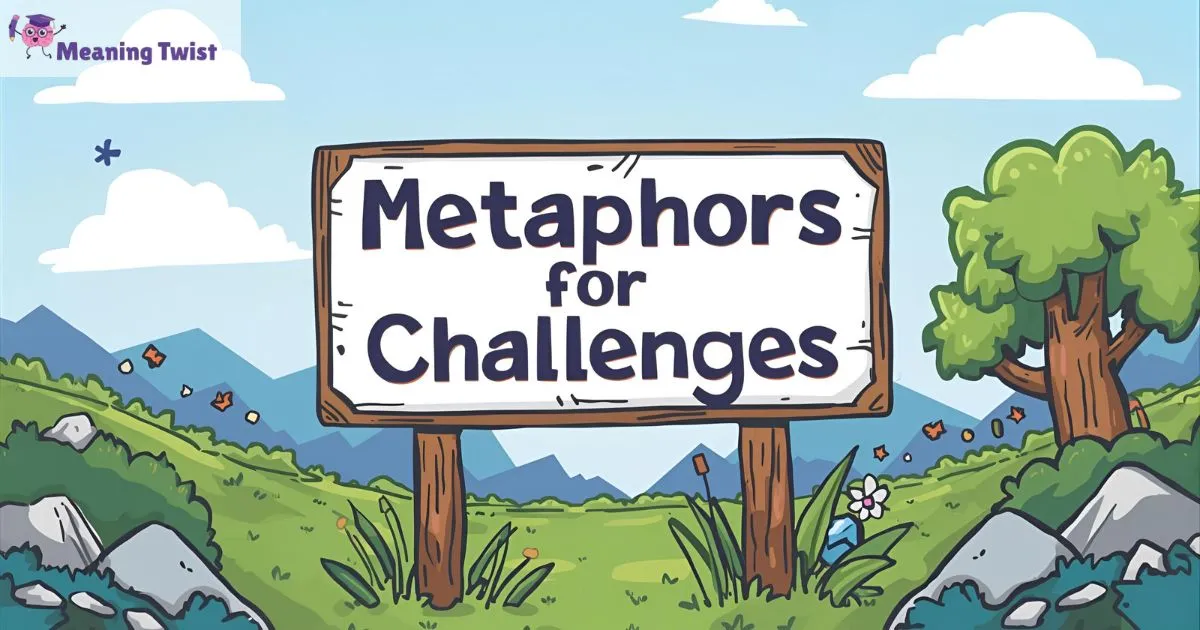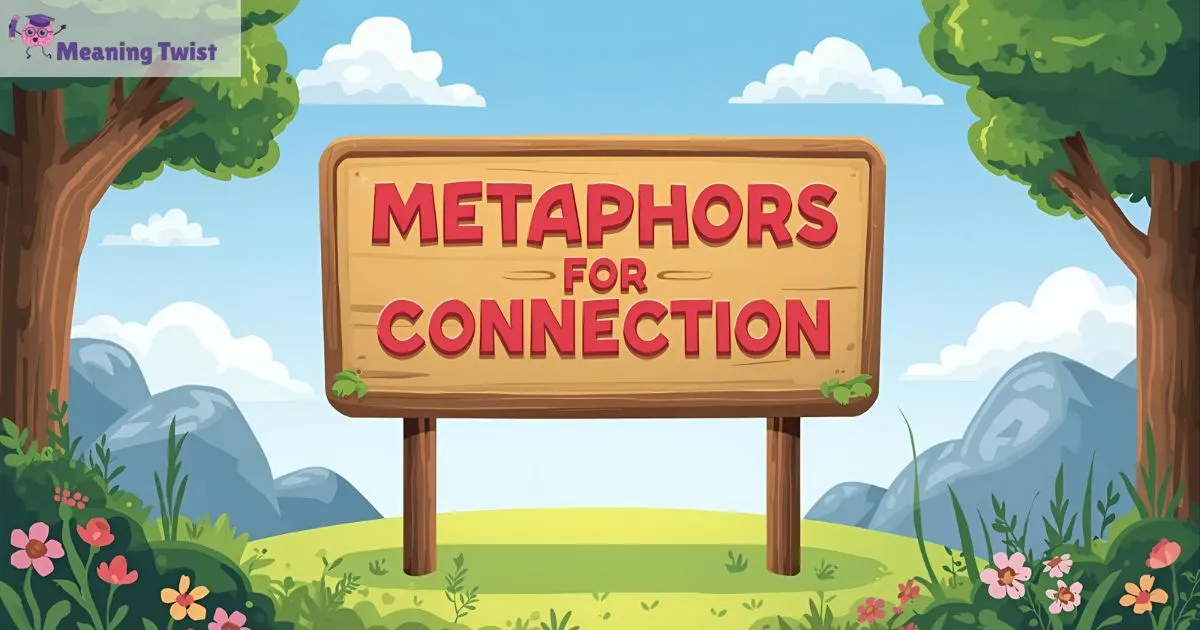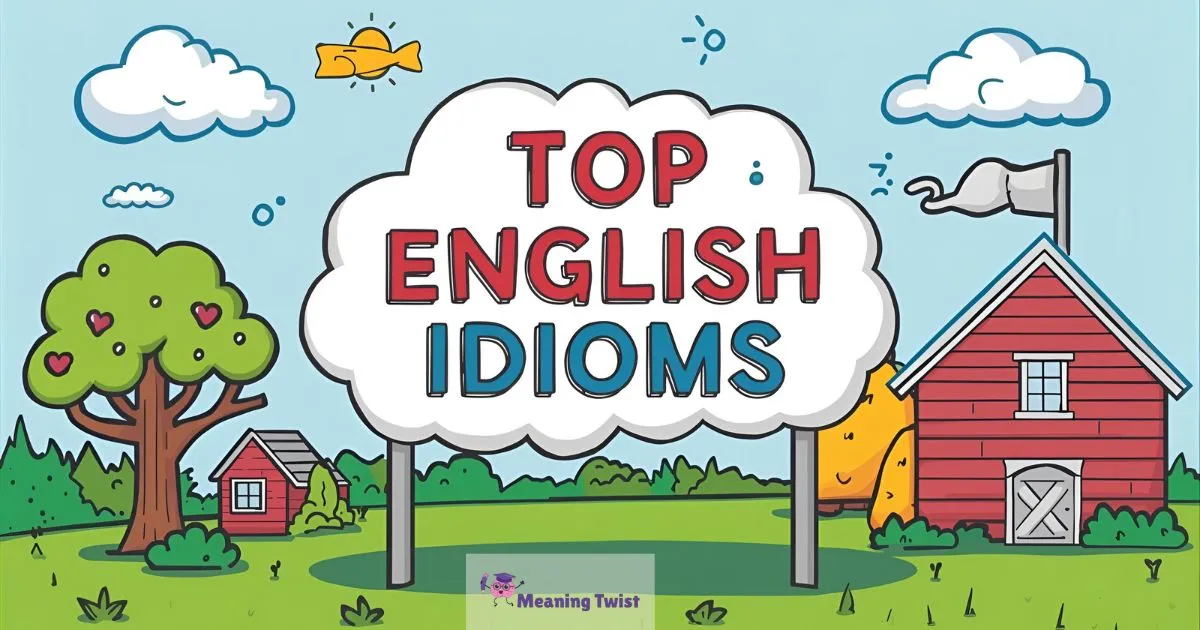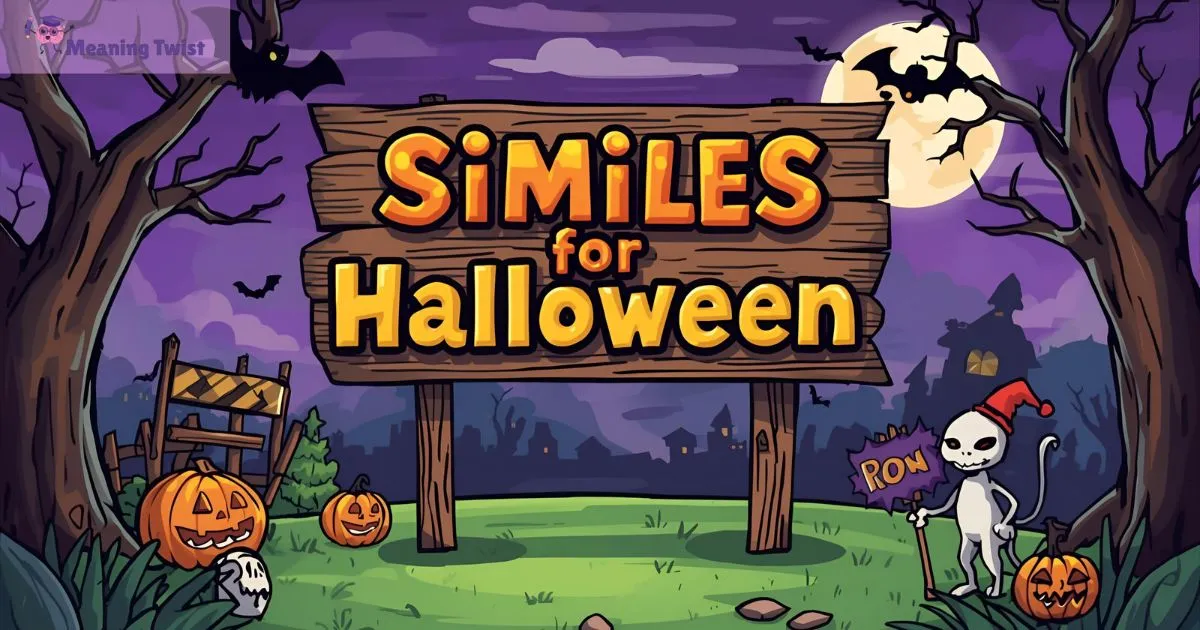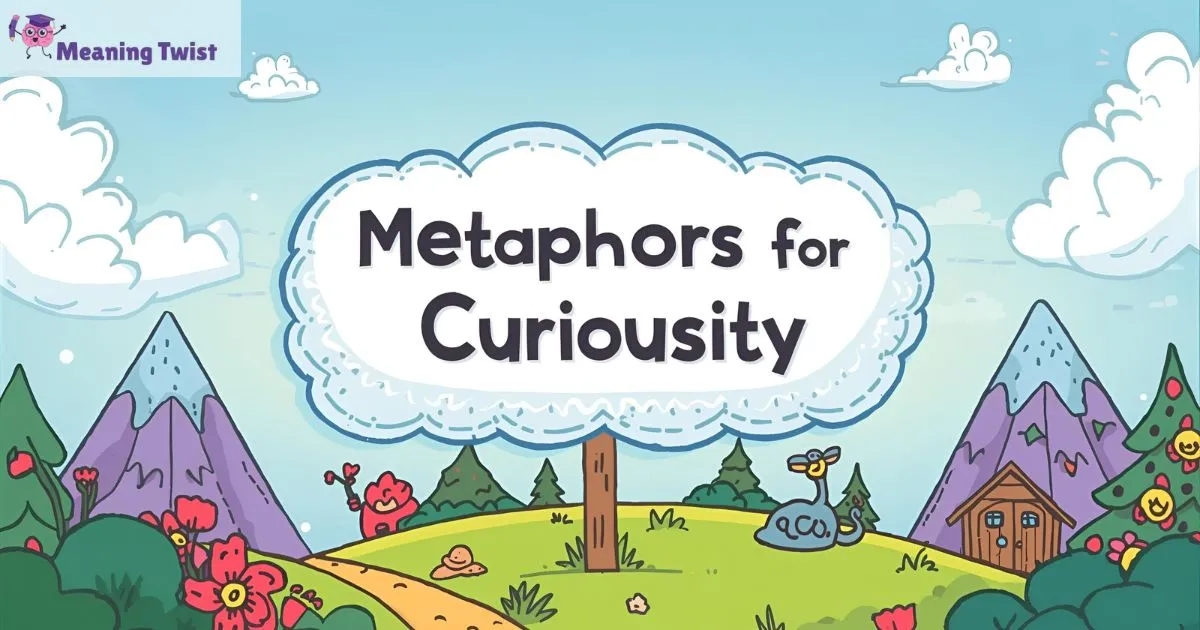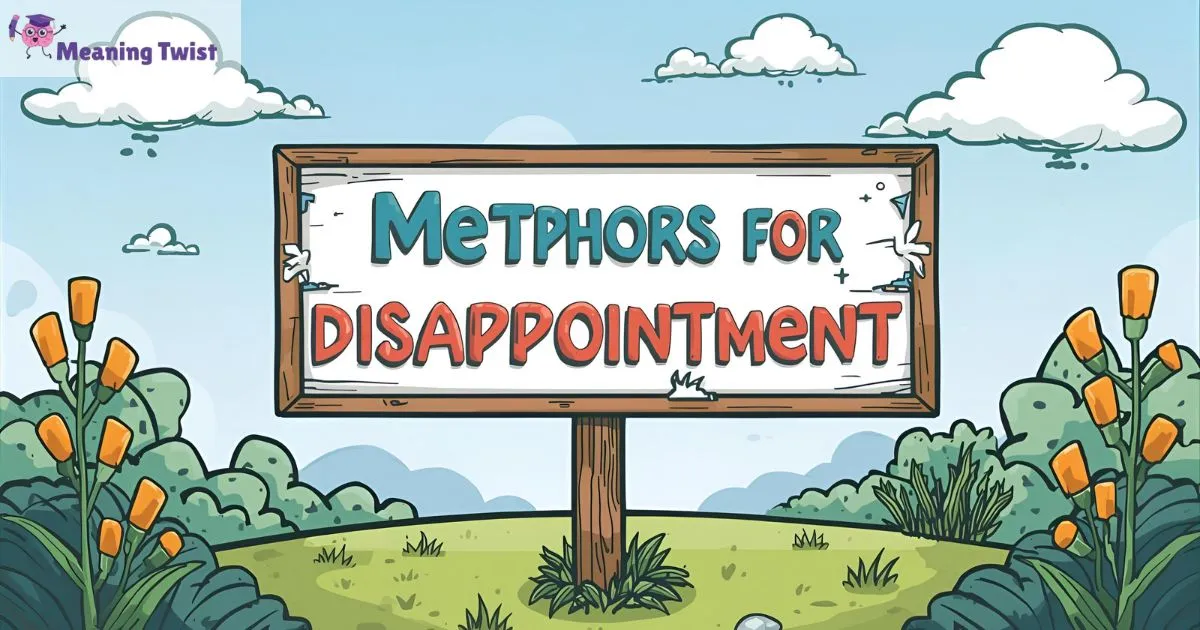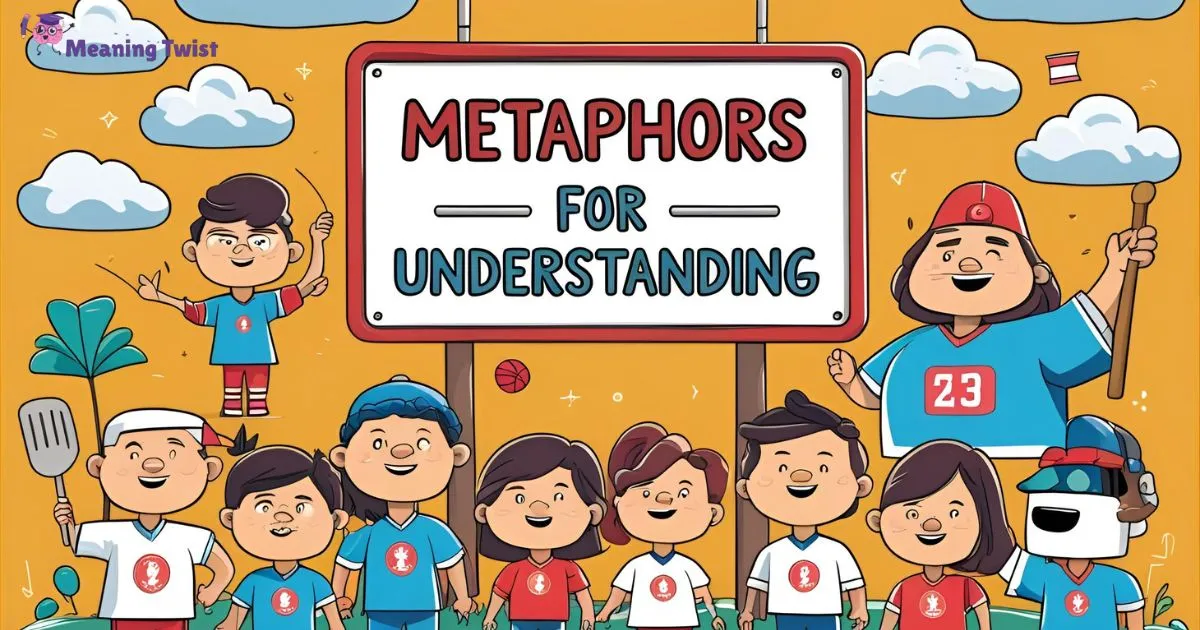
Metaphors for Understanding can feel like tiny bridges that connect big ideas to simple pictures in our minds. Idioms and metaphors are playful tools in English that use everyday images to explain tricky thoughts. They make language colorful, fun, and much easier to remember, almost like a teacher turning a hard math problem into a quick story.
When we use metaphors, we don’t say things directly instead, we paint a picture with words. For example, saying “Understanding is a key that unlocks a closed door” shows that learning something new gives us access to knowledge, just like a key opens a lock. This makes complicated feelings and situations clear in a way everyone can enjoy.
With these creative expressions, you’ll discover how language can explain emotions, ideas, and even problem-solving in powerful ways. Get ready to explore how Metaphors for Understanding can light up your everyday conversations!
Metaphors for Understanding
1. Light Bulb Moment
Meaning
A “light bulb moment” is when you suddenly understand something that felt confusing before, like a bright idea popping into your head.
When to Use It
Use this when you or a friend finally figure something out after trying hard to understand it.
In a Sentence
- I had a light bulb moment when I solved the tricky math problem.
- She had a light bulb moment when she understood the story’s message.
- They had a light bulb moment while building the science project.
Other Ways to Say
- A sudden idea
- A big “aha!”
- Brain spark
Fun Tip or Visual Clue
Picture a little cartoon light bulb glowing above your head whenever you suddenly “get it.”
2. A Window Opening
Meaning
“A window opening” means a new way of seeing or understanding something, just like when you open a window and fresh air comes in.
When to Use It
Use this when you realize a new idea or get a chance to learn something exciting.
In a Sentence
- I felt like a window was opening when I learned about space rockets.
- He said it was like a window opening when he discovered a new game trick.
- They thought it was a window opening when the teacher explained it clearly.
Other Ways to Say
- A fresh view
- New chance
- Open door
Fun Tip or Visual Clue
Imagine pulling open a window and suddenly seeing a bright rainbow outside—it’s like your brain finding something new.
3. A Puzzle Coming Together
Meaning
When you say “a puzzle coming together,” it means small pieces of information are joining to make a full picture, just like finishing a jigsaw puzzle.
When to Use It
Use this when you finally understand something after putting together different clues or ideas.
In a Sentence
- I felt the puzzle coming together when I read the last chapter of the book.
- He smiled because the puzzle was coming together during the experiment.
- They saw the puzzle coming together while studying history facts.
Other Ways to Say
- Everything fits
- It makes sense
- All pieces connect
Fun Tip or Visual Clue
Think of fitting puzzle pieces into the right spot—your brain is doing the same thing when you understand.
4. Seeing the Forest, Not Just the Trees
Meaning
This means looking at the big picture instead of focusing only on tiny details.
When to Use It
Use this when you want to remind yourself or others to look at the whole situation, not just one part.
In a Sentence
- I saw the forest, not just the trees, when I understood the whole project plan.
- He learned to see the forest, not just the trees, during the group work.
- They saw the forest, not just the trees, when they finished the puzzle.
Other Ways to Say
- Big picture
- Whole idea
- Looking wide
Fun Tip or Visual Clue
Imagine zooming out on a map—suddenly you don’t just see one street, but the whole city!
5. Turning on a Light
Meaning
It means suddenly understanding something, like flipping a switch and the room becomes clear.
When to Use It
Use this when you or a friend finally “get” an idea after being confused.
In a Sentence
- It was like turning on a light when I solved the riddle.
- She said it was like turning on a light when the teacher explained.
- They felt like turning on a light when the answer became clear.
Other Ways to Say
- Bright idea
- Click moment
- Brain light
Fun Tip or Visual Clue
Picture yourself in a dark room. Then click—the light comes on and everything makes sense!
6. Connecting the Dots
Meaning
This means putting pieces of information together until you understand the full idea.
When to Use It
Use this when you figure something out by joining clues or hints.
In a Sentence
- I was connecting the dots when I solved the mystery book.
- He connected the dots to finish the math problem.
- They connected the dots during the science project.
Other Ways to Say
- Making links
- Joining clues
- Tying things together
Fun Tip or Visual Clue
Think of a dot-to-dot picture—when you join the lines, the hidden image appears!
7. A Key Unlocking a Door
Meaning
This means finding the right idea or answer that makes everything open up.
When to Use It
Use this when you or someone else discovers the solution to a tricky problem.
In a Sentence
- I found the key unlocking the door when I remembered the formula.
- She had the key unlocking the door when she figured out the riddle.
- They felt the key unlocking the door when the answer was revealed.
Other Ways to Say
- Secret code
- Unlocking idea
- Right answer
Fun Tip or Visual Clue
Picture yourself holding a golden key and opening a big door—behind it is the answer!
8. A Map for the Mind
Meaning
This means having a plan or guide that helps you understand where to go with ideas.
When to Use It
Use this when talking about directions, steps, or a clear way to think.
In a Sentence
- I used a map for the mind to remember the story details.
- He drew a map for the mind to study for the test.
- They created a map for the mind while planning the project.
Other Ways to Say
- Brain guide
- Idea plan
- Thinking chart
Fun Tip or Visual Clue
Imagine a treasure map—but instead of gold, it leads your brain to understanding!
9. A Ladder to Climb
Meaning
This means learning step by step, just like climbing one rung at a time.
When to Use It
Use this when you talk about progress, learning slowly, or moving up in knowledge.
In a Sentence
- I felt like I was climbing a ladder when I learned harder math.
- He said it was like a ladder to climb in reading practice.
- They climbed the ladder of ideas in their science class.
Other Ways to Say
- Step by step
- Moving up
- Climbing higher
Fun Tip or Visual Clue
Picture yourself on a ladder—each step is a new piece of knowledge!
10. Putting on Glasses
Meaning
It means suddenly seeing things more clearly and understanding better.
When to Use It
Use this when something confusing becomes easy to understand.
In a Sentence
- It felt like putting on glasses when I learned the rule.
- She said it was like putting on glasses when she understood the lesson.
- They felt like putting on glasses when the teacher explained.
Other Ways to Say
- Clear view
- Sharp sight
- See better
Fun Tip or Visual Clue
Imagine blurry writing turning crystal clear the moment you put on glasses.
Read More: Metaphors for Anger From Firestorms to Furious Felines
11. Building Blocks
Meaning
This means learning small parts that stack together to make a big idea.
When to Use It
Use this when you’re learning step by step or creating something piece by piece.
In a Sentence
- I used building blocks of words to write my story.
- He learned math like building blocks, one step at a time.
- They used building blocks of facts to finish the project.
Other Ways to Say
- Step stones
- Idea pieces
- Knowledge stack
Fun Tip or Visual Clue
Picture colorful toy blocks stacking up until they make a tall tower—just like your learning!
12. A Bridge to New Ideas
Meaning
It means connecting one idea to another, like a bridge linking two places.
When to Use It
Use this when you move from one thought to another or discover something new.
In a Sentence
- I built a bridge to new ideas when I read the science book.
- She made a bridge to new ideas by connecting art and math.
- They found a bridge to new ideas in their teamwork.
Other Ways to Say
- Idea link
- Pathway
- Connector
Fun Tip or Visual Clue
Imagine walking over a bridge that takes you from one side of a river of confusion to the side of understanding.
13. A Flash of Lightning
Meaning
This means an idea comes quickly and brightly, like a sudden lightning strike.
When to Use It
Use this when you think of something smart in an instant.
In a Sentence
- I had a flash of lightning when I solved the puzzle.
- He got a flash of lightning with a clever plan.
- They had a flash of lightning during the quiz.
Other Ways to Say
- Bright spark
- Quick idea
- Brain flash
Fun Tip or Visual Clue
Picture the sky lighting up at night—it’s sudden, just like a new thought.
14. A Toolbox for the Brain
Meaning
This means having many tools or skills in your mind to solve problems.
When to Use It
Use this when you talk about strategies, tricks, or knowledge you can use.
In a Sentence
- I used my toolbox for the brain to write my essay.
- He opened his toolbox for the brain to fix the math problem.
- They shared a toolbox for the brain in group work.
Other Ways to Say
- Idea kit
- Brain bag
- Smart tools
Fun Tip or Visual Clue
Imagine a backpack full of pencils, rulers, and erasers—but inside your head for ideas!
15. A Doorway to Discovery
Meaning
This means a chance to find or learn something new, like walking through a door.
When to Use It
Use this when you discover exciting knowledge or experiences.
In a Sentence
- Reading was my doorway to discovery about dinosaurs.
- She found a doorway to discovery in her art class.
- They opened a doorway to discovery with the experiment.
Other Ways to Say
- New chance
- Open gate
- Path to learning
Fun Tip or Visual Clue
Picture opening a magical door and finding a room filled with glowing books and treasures.
16. A Web of Ideas
Meaning
This means lots of ideas connected together, like a spider’s web.
When to Use It
Use this when many thoughts or facts connect in your brain.
In a Sentence
- I made a web of ideas for my story map.
- He spun a web of ideas to plan his project.
- They shared a web of ideas in their group work.
Other Ways to Say
- Idea net
- Brain web
- Thought links
Fun Tip or Visual Clue
Imagine a spiderweb catching sparkly ideas like fireflies—it shows how everything connects.
17. A Light in the Dark
Meaning
This means finding clarity or hope when things seem confusing or hard.
When to Use It
Use this when something helps you understand during a tough time.
In a Sentence
- The teacher’s help was a light in the dark during math.
- He found a light in the dark while reading a guidebook.
- They saw a light in the dark when the problem was solved.
Other Ways to Say
- Bright guide
- Hope spark
- Clear way
Fun Tip or Visual Clue
Think of a flashlight showing you the right path in a dark cave—it’s like understanding!
18. A Recipe for Learning
Meaning
This means having clear steps to follow to understand something, like cooking.
When to Use It
Use this when you follow instructions or steps to learn.
In a Sentence
- I used a recipe for learning to bake cupcakes in class.
- He followed a recipe for learning in science.
- They shared a recipe for learning in art class.
Other Ways to Say
- Step plan
- Learning guide
- How-to steps
Fun Tip or Visual Clue
Imagine mixing flour, sugar, and eggs—but instead of cake, you’re cooking up knowledge.
19. Like Cracking a Code
Meaning
This means solving a tricky problem, like breaking a secret code.
When to Use It
Use this when you finally figure something out that was hard.
In a Sentence
- It felt like cracking a code when I solved the riddle.
- He said it was like cracking a code in the computer game.
- They felt like cracking a code during the test.
Other Ways to Say
- Secret solved
- Mystery cracked
- Hidden answer
Fun Tip or Visual Clue
Picture typing numbers into a safe—when it clicks open, you’ve cracked the code!
20. Digging for Answers
Meaning
This means searching deeply for information, like digging in the ground.
When to Use It
Use this when you’re researching, studying, or asking lots of questions.
In a Sentence
- I was digging for answers in my history book.
- He kept digging for answers in the math problem.
- They were digging for answers with their teacher’s help.
Other Ways to Say
- Searching hard
- Looking deep
- Hunting clues
Fun Tip or Visual Clue
Imagine using a shovel to dig up shiny treasure—just like finding answers!
21. A Mirror Reflecting Ideas
Meaning
This means seeing your thoughts or learning by reflecting, like a mirror shows your face.
When to Use It
Use this when you think about your own ideas or share them with others.
In a Sentence
- Writing in my journal was like a mirror reflecting ideas.
- He found a mirror reflecting ideas in his drawing.
- They used a mirror reflecting ideas in their group talk.
Other Ways to Say
- Thought reflection
- Idea image
- Brain mirror
Fun Tip or Visual Clue
Imagine a shiny mirror that shows not your face, but your glowing thoughts!
22. Like Peeling an Onion
Meaning
This means learning something layer by layer, just like peeling an onion.
When to Use It
Use this when you slowly discover new parts of a subject.
In a Sentence
- It was like peeling an onion when I studied history.
- He said learning grammar was like peeling an onion.
- They found math was like peeling an onion, with steps inside steps.
Other Ways to Say
- Layer by layer
- Step uncovering
- Hidden parts
Fun Tip or Visual Clue
Imagine peeling an onion and finding new layers each time—your brain does the same!
23. A Compass for Thinking
Meaning
This means having guidance or direction in your thoughts, like a compass shows north.
When to Use It
Use this when you’re making decisions or finding the right path.
In a Sentence
- I used a compass for thinking to choose the right answer.
- He followed a compass for thinking in his project.
- They used a compass for thinking during teamwork.
Other Ways to Say
- Brain guide
- Thought pointer
- Mind direction
Fun Tip or Visual Clue
Picture holding a shiny compass that doesn’t point north—but toward good ideas!
24. Like Tuning a Radio
Meaning
This means adjusting your focus until things become clear, like tuning a radio.
When to Use It
Use this when you’re trying to concentrate and make sense of something.
In a Sentence
- It was like tuning a radio when I paid attention in class.
- He tuned his brain like a radio to focus on reading.
- They felt like tuning a radio during the group work.
Other Ways to Say
- Focusing in
- Clear signal
- Brain tuning
Fun Tip or Visual Clue
Imagine twisting a radio knob—at first it’s fuzzy, then suddenly clear!
25. A Tree Growing in Your Brain
Meaning
This means your knowledge grows slowly and strongly, like a tree.
When to Use It
Use this when you’re talking about learning over time.
In a Sentence
- I felt a tree growing in my brain as I read more books.
- He planted a tree in his brain with new science facts.
- They saw a tree growing in their brains during class.
Other Ways to Say
- Growing mind
- Idea plant
- Brain roots
Fun Tip or Visual Clue
Imagine a little tree sprouting inside your head, with each leaf a new idea!
26. A Treasure Hunt
Meaning
This means searching for hidden knowledge, like hunting for treasure.
When to Use It
Use this when you’re learning with excitement or solving mysteries.
In a Sentence
- Reading was a treasure hunt for new words.
- He felt a treasure hunt in his science project.
- They joined a treasure hunt in their group work.
Other Ways to Say
- Idea hunt
- Clue chase
- Knowledge search
Fun Tip or Visual Clue
Picture holding a map with an “X” on it—your prize is answers and ideas!
27. Like Climbing a Hill
Meaning
This means learning can be hard at first, but it gets easier at the top.
When to Use It
Use this when talking about challenges in studying or problem solving.
In a Sentence
- It was like climbing a hill when I started reading a new book.
- He said writing was like climbing a hill, but worth it.
- They felt like climbing a hill during the test.
Other Ways to Say
- Hard at first
- Step climb
- Brain workout
Fun Tip or Visual Clue
Imagine puffing up a hill, then sliding down happily on the other side—that’s learning!
28. A Road to the Truth
Meaning
This means a path that leads you to the real answer or understanding.
When to Use It
Use this when you’re finding out facts or solving mysteries.
In a Sentence
- I walked a road to the truth while studying history.
- He found a road to the truth in his experiment.
- They took a road to the truth during class discussion.
Other Ways to Say
- Pathway to answers
- Journey to fact
- Route to knowledge
Fun Tip or Visual Clue
Imagine walking down a sunny road with signs pointing toward “TRUTH.”
29. A Magnet for Ideas
Meaning
This means attracting ideas to your brain, like a magnet pulls metal.
When to Use It
Use this when you’re full of new thoughts or creativity.
In a Sentence
- I was a magnet for ideas when I wrote my poem.
- He turned into a magnet for ideas during art class.
- They became a magnet for ideas while brainstorming.
Other Ways to Say
- Brain puller
- Idea catcher
- Thought magnet
Fun Tip or Visual Clue
Picture holding a giant magnet and colorful ideas zooming toward you.
Read More: Metaphors for Unpredictable That Capture Life’s Twists
30. A Seed of Thought
Meaning
This means a small idea that can grow into something big.
When to Use It
Use this when you start with one little thought that becomes more.
In a Sentence
- I planted a seed of thought for my story idea.
- He had a seed of thought about his invention.
- They shared a seed of thought that grew into a project.
Other Ways to Say
- Tiny idea
- Starting point
- Brain sprout
Fun Tip or Visual Clue
Imagine planting a seed in the ground—and it grows into a tall tree of knowledge!
31. Like a Fan Blowing Away Confusion
Meaning
This means clearing away mixed-up thoughts, like a fan pushes away heat.
When to Use It
Use this when something makes things clearer.
In a Sentence
- It was like a fan blowing away confusion when I read the answer.
- He felt like a fan blew away confusion after help from his teacher.
- They said it was like a fan blowing away confusion during class.
Other Ways to Say
- Clear air
- Fresh mind
- Brain breeze
Fun Tip or Visual Clue
Imagine a fan turning on in your brain, sweeping away the foggy thoughts!
32. A Hand Reaching Out
Meaning
This means getting help or guidance that makes understanding easier.
When to Use It
Use this when someone supports you while learning.
In a Sentence
- I felt a hand reaching out when my friend explained the problem.
- He had a hand reaching out from his teacher during class.
- They saw a hand reaching out while working in teams.
Other Ways to Say
- Helping hand
- Friendly support
- Guiding help
Fun Tip or Visual Clue
Imagine a big hand pulling you up when you’re stuck on a tough question.
33. A Toolbox of Ideas
Meaning
This means having many different thoughts and ways to solve problems.
When to Use It
Use this when you have choices of ideas and skills to use.
In a Sentence
- I opened my toolbox of ideas to write a story.
- He carried a toolbox of ideas into art class.
- They shared a toolbox of ideas during teamwork.
Other Ways to Say
- Idea kit
- Thought box
- Brain bag
Fun Tip or Visual Clue
Picture a real toolbox, but instead of hammers and nails, it’s full of shiny ideas!
Exercise to Practice
- When Sam finally solved the hard riddle, he had a “____ ____ moment.”
- Mia said learning multiplication was like a “window ____” to a new world of math.
- Solving the mystery felt like a “____ coming together.”
- Teacher reminded us to see the big picture: “the forest, not just the ____.”
- Understanding fractions was like “turning on a ____” in Ava’s head.
- Finding the answer in science class was like “____ the dots.”
- Knowledge is like a “key ____ a door” to new ideas.
- A study guide is like a “____ for the mind.”
- Every new lesson feels like climbing “a ____ to climb.”
- When Emma put on her new glasses, she said it was like “putting on ____.”
- Learning step by step is like using “building ____.”
- Reading different books is like crossing “a ____ to new ideas.”
- A sudden realization can feel like “a flash of ____.”
- Collecting skills for school is like having a “____ for the brain.”
Answer Key
- Light Bulb
- Opening
- Puzzle
- Trees
- Light
- Connecting
- Unlocking
- Map
- Ladder
- Glasses
- Blocks
- Bridge
- Lightning
- Toolbox
How can metaphors for understanding make everyday conversations more clear and meaningful?
Metaphors for Understanding play a powerful role in everyday conversations because they transform complex ideas into simple, relatable images. Instead of explaining feelings or experiences in a flat way, using figurative language, idiomatic expressions, or symbolic comparisons helps people instantly connect and grasp meaning.
When someone says life feels like a roller coaster or their mind is a stormy sea, it paints a vivid picture that plain words can’t. By weaving in these creative tools, conversations become more engaging, emotional, and memorable, making communication clear and impactful.
Final Words
You’re not alone if you’ve ever felt stuck trying to explain your thoughts or emotions. That’s exactly where Metaphors for Understanding step in they turn tricky feelings into simple, clear images that everyone can relate to.
When you’re at school sharing an idea, at home expressing how you feel, or with friends trying to connect, these creative phrases make conversations easier and more meaningful. Next time you’re feeling this way, you’ll know exactly what to say! Keep exploring metaphors, use them with confidence, and watch your words truly come alive.

Hi, I am Joey, the admin of meaningtwist.com. I simplify deep meanings and twist ordinary words into extraordinary insights to spark your curiosity and clicks!

